Sugar is one of the most dangerous ingredients on the market. It’s addictive, added to almost every processed food, and will make you overweight, depressed and sick if you eat too much. In fact, Americans eat close to 130 pounds of the stuff per person per year (4 times more than the recommended daily allowance), likely because it is so addictive. That’s why it’s exciting to know there are alternative sweeteners made in nature, like “stevia,” that don’t wreak havoc on your health – or do they? Is Stevia safe? That’s what I went on a quest to find out. Here’s what happened…

What Is Stevia?

For those of you that are hearing about stevia for the first time, it is a plant that is typically grown in South America, and while its extract is 200 times sweeter than sugar, it does not raise blood insulin levels. That’s what makes it so popular. However in 1991 the FDA refused to approve this substance for use due to pressure from makers of artificial sweeteners like Sweet n’ Low and Equal (a one billion dollar industry). But in 2008, the FDA approved the use of rebaudioside compounds that were derived from the stevia plant by Coca-Cola (Cargill) and PepsiCo – hmmm doesn’t that sound suspicious? Not until a major food company got involved did stevia become legal, and only after it had been highly processed using a patentable chemical-laden process…so processed that Truvia (Coca-Cola’s branded product) goes through about 40 steps to process the extract from the leaf, relying on chemicals like acetone, methanol, ethanol, acetonitrile, and isopropanol. Some of these chemicals are known carcinogens (substances that cause cancer), and none of those ingredients sound like real food, do they?
The whole leaf stevia that you can grow in your backyard (and has been used for centuries in countries like Brazil and Paraguay) remains a non-approved food additive by the FDA. However, rebaudioside A (the stevia extract) that was approved by the FDA has not been used for centuries and long term human health impacts have not been studied and are still unknown. The sweetener/sugar industry wields powerful influence over what is ultimately approved at the FDA, and this is just another example where they are influencing decisions that don’t make sense. How can a chemically derived extract be deemed safe in processed food and a plant from mother nature not?
What Kind Of Stevia To Avoid
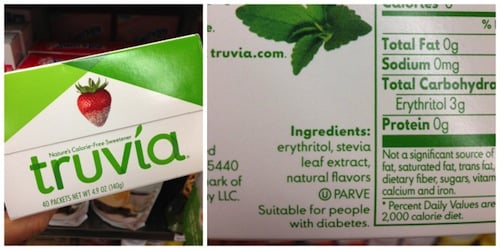
The 40-step patented process used to make Truvia should make you want to steer clear of this stevia product alone, but there are two other concerning ingredients added (not only to Truvia but other stevia products as well). First, erythritol is a naturally occurring sugar that is sometimes found in fruit, but food manufacturers don’t actually use the natural stuff. Instead they start with genetically engineered corn and then go through a complex fermentation process to come up with chemically pure erythritol. Check out the manufacturing process below:
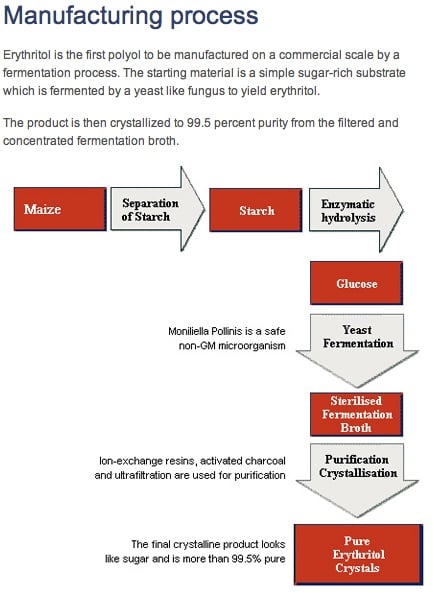
Credit: Cargill
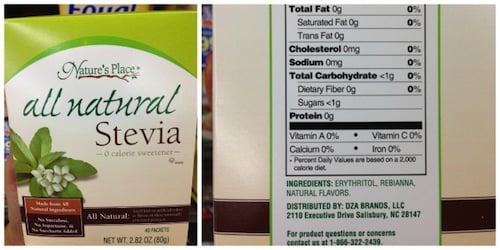
“Natural flavors” is another ingredient added to powdered and liquid stevia products, likely due to the fact that once the stevia leaf is processed it can develop a metallic taste. Manufactured natural flavor is contributing to what David Kessler (former head of the FDA) calls a “food carnival” in your mouth. This makes it difficult to stop eating or drinking because the flavors they have synthesized will trick your mind into wanting more and more. When companies use manufactured flavor, they are literally “hijacking” your taste buds one-by-one; that’s why I recommend putting products that contain “natural flavors” back on the shelf.
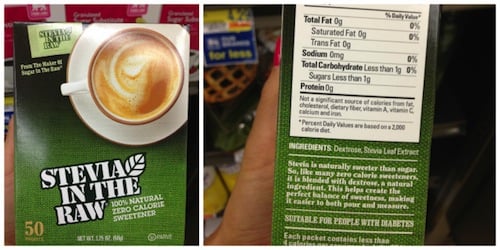
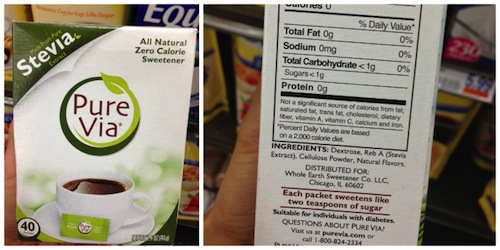
“Stevia in the Raw” sounds pure and natural, but when you look at the ingredients the first thing on the label is “dextrose” – so it’s certainly not just stevia in the raw. And Pepsi Co’s “Pure Via,” also pictured above, isn’t exactly pure either with this ingredient being first on the label, too. Dextrose is a sweetener that’s also derived from genetically engineered corn and has a long complicated manufacturing process, just like erythritol.
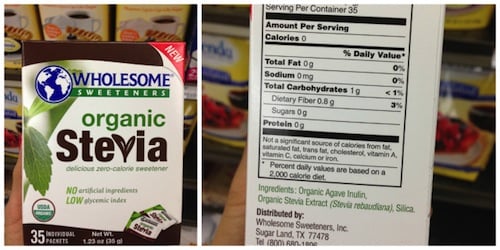
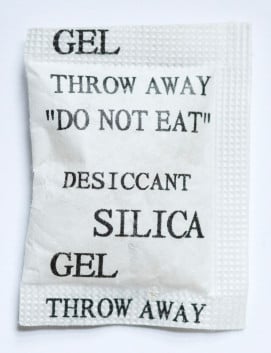
Even certified organic stevia can have sneaky ingredients added, like this one above which has more organic agave inulin than the stevia extract itself. Agave inulin is a highly processed fiber derivative from the blue agave plant. Also on the ingredient list is an item you are probably familiar with from those little packets sometimes found in boxed goods – silica (pictured). It is added to improve the flow of powdery substances and is the same ingredient that helps strengthen concrete and creates glass bottles and windowpanes. It may cause irritation of the digestive tract (if eaten) and irritation of the respiratory tract (if accidentally inhaled). While it is non-toxic and probably won’t kill you in small quantities, it’s definitely not a real food ingredient I would cook with or that I want to be putting in my body.
How To Choose The Right Kind Of Stevia
Luckily there are ways to enjoy this sweet leaf closer to it’s natural state… because let’s be honest, the no-calorie artificial sweeteners out there are really dreadful, and no one should consume them (check this post for the low down on those). So here’s what you can do:
- Buy a stevia plant for your garden (luckily it’s totally legal!) or purchase the pure dried leaves online – you can grind up them up using a spice grinder (or use a mortar and pestle) for your own powdered stevia.
- When choosing products already sweetened with stevia, look for “whole leaf stevia” on the ingredient label. For example one of my favorite protein powders is made with “whole stevia leaf” instead of rebaudioside a or stevia extract.
- Add fresh or dried leaves directly to tea or drinks for natural sweetness (note the straight stevia leaves are only 30-40 times sweeter than sugar, vs. 200 times using the extract).
- Make your own liquid stevia extract (see graphic below for recipe).
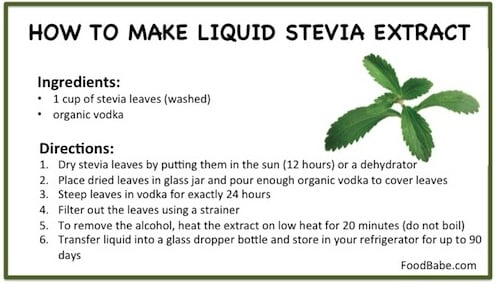
- If you are not up for getting a stevia plant of your own or making your own extract, remember to look for a stevia extract that is 100% pure without added ingredients (Sweet Leaf & Trader Joe’s have versions).
And when all else fails, choose a suitable alternative and forget stevia altogether. Use honey, pure maple syrup, or I personally prefer coconut palm sugar, since it is low glycemic (making it more diabetic friendly) and one of the most natural unprocessed forms of sugar available. It is naturally high in amino acids – has 10,000 times more potassium, 20 times more magnesium and 20 times more iron than conventional sugar. I use it all the time in my baking, from pound cake to muffins to a recent delicious cookie that is low in sugar – check out all those recipes here!
If you know someone who uses artificial sweeteners or stevia, please share this post with them.
Wishing you the best health life has to offer,
Food Babe








NOW brand Better Stevia Extract Powder is organic.
Here is the ingredient list:
Nutrition Facts
Serving Size 1/32 Teaspoon (45 mg)
Servings Per Container 2,511
Amount Per Serving % Daily Value*
Calories 0
Total Fat 0 g 0%
Sodium 0 mg 0%
Total Carbohydrate 0 g 0%
Sugars 0 g
Protein 0 g
*Percent Daily Values are based on a 2,000 calorie diet. Your daily values may be higher or lower depending on your calorie needs.
Calories 2,000 2,500
Total Fat Less than 65 grams 80 grams
Saturated Fat Less than 20 grams 25 grams
Cholesterol Less than 300 mg 300 mg
Sodium Less than 2,400 mg 2,400 mg
Total Carbohydrate 300 grams 375 grams
Dietary Fiber 25 grams 30 grams
Calories per gram:
Fat 9 Carbohydrate 4 Protein 4
Ingredient: Certified Organic Stevia Extract Powder (Stevia rebaudiana) (Leaf).
Contains no sugar, salt, yeast, wheat, gluten, corn, soy, milk, egg, shellfish, preservatives, artificial colors, artificial flavors or artificial sweeteners. Vegetarian/Vegan Product.
Just have to read labels…
This one is available at health food stores and online a source is swansonvitamins.com
This is the only Stevia I use. I have tried some of the other organic brands but they always leave a bitter taste but NOW doesn’t. In fact, I recently bought mine from Swanson Vitamins. Luckyvitamin.com is another great place to buy this from. I always compare prices to see who offers the best deal.
I also use the NOW brand Organic Stevia concentrate, in powder form. I have used it forever and like that it has only one ingredient. It is processed (that is why it is white) but I really dislike the green powders. They do not work at all to sweeten liquid beverages. Maybe for baking they would be ok.
But this has been altered hence the “Stevia Rebaudiana”, and is one of the things she said to stay away from. FYI!
Stevia Rebaudiana is the name of the plant.
You show SweetLeaf as one of the recommendations for stevia extract that is 100% pure without added ingredients but looking at the label on this brand it lists “inulin soluble fiber” as the first ingredient. WHAT IS THAT?
Inulin is a type of fiber found in plants. It’s natural but some people are sensitive to it (may cause stomach cramps).
I looked into one of Trader Joe’s Stevia products they sell. The one they sell is a small canister of Stevia and it is 100% pure no additives and organic for those who don’t have time to make there own.
Have you done any research on monk fruit extract?
Stevia one of the best remedies for DIABETES.
I think this stevia extract powder looks like a great option- what do you think?
http://store.trimhealthymama.com/product-p/1085-455175149.htm
i’m interested in replies to this!!!???
I ordered it and wanted to love it. Put it in my coffee and couldn’t drink it. 🙁
Thanks for the update, Katrina! I wonder if it would taste better in smoothies.
Have you heard of STEVITA? It’s a liquid extract. Freshly pressed from the leaves and not reconstituted. Ingredients: Stevia rebaudiana bertoni (leaves) and other ingredients is distilled water and grapefruit seed extract (a natural preservative).
FYI, grapefruit seed extract is not a preservative, it is an antioxidant.
Antioxidants prevent oxidation therefore they are often used as a preservative to prevent oxidation of a food, to preserve the quality of the food.
Vinegar is a preservative, doesn’t mean it’s bad for you.
One more question… I used Trader Joe’s liquid stevia in my smoothies and the taste is great. But how do you substitute powdered stevia for white sugar in recipes… so many times in my baking I resort to organic cane sugar to keep the taste and texture right- however I’d love to use a healthier sweetener if it doesn’t compromise the result!
Note that grapefruit and grapefruit seed extract are prohibited for those on blood thinners.
I did not know that! I know you aren’t supposed to drink Grapefruit juice with any medications. But did not know about the extract! I take blood thinners for a Cardiac Stent! Thanks for sharing!
Looking at a SweetLeaf product it lists “natural flavors” which is not favorably documented in this article and appear to be discouraged.
NOW brand Better Stevia Extract Powder is organic is what I’ve been using for a few years, what do you think of that brand?
What about Sweetnol? Would you consider it safe? It is used in the Honest Company’s Kids Multivitamins.
I like the idea of making my own stevia, but being diabetic, hard liquor is not ok for my liver. Is there a non-alcoholic option that can be used?
The alcohol (Ethanol) is used as the solvent to draw out the desired compounds from a macerated or ground up dry plant source. After the extraction is complete, slowly and gently heating (not boiling) the liquid for 20-30 minutes afterward evaporates all the alcohol, which is why it should then be stored in dark bottles and should be refrigerated to prevent spoilage. You could also not heat it and store the alcohol extraction (for longer storage) and heat it just prior to consumption. For instance, when making hot herbal teas or other hot beverage: add drops of the alcohol stevia extract to the surface of the hot liquid beverage and let it cool for a while. The alcohol will evaporate from the surface of the hot liquid while the tea steeps. It doesn’t take as long as 20 minutes due to the small amount floating on top. If it cools down too much while waiting, reheat it gently to ensure all alcohol evaporates before ingesting.
Here is a protocol for stevia extraction:
http://nutritionstripped.com/how-to-make-stevia-extract/
You can make a simple syrup by using a of the leaves in a small pot of water and use that instead.
I love lemonade. I drink lemonade by the gallon. I went from Countrytime mix to Crystal Light to making my own from Stevia and lemons. It is great. One stalk of leaves, boiled and left to steep. Two squeezed lemons in 2 quarts of water. If you don’t need a syrup, I suggest water as the solvent. Works for me and I haven’t found any health warnings about this method of extraction. Please contribute a reply if there is a reason not to steep. Thanks.
Like to know, if Stevia-made by Emperor’s is on theGMO- poison list?????????????? Thank you Debbie
Can anyone tell me where I can buy a stevia plant?
Amazon.com. I ordered the seeds. They also have the plants.
You can get it at any nursery or agrisupply that sell plants.
You can purchase them at any nursery or agrisupply store that sell plants.
I have bought Stevia plants at Wholefoods in their potted herb area situated outside.
I bought my stevia plant at Home Depot for about $3. Has doubled in size and continues to grow, now to do something with it. I use the NOW brand currently and its excellent.
I have stevia plants and peppermint. I use both is teas. I simply crush leaves with edge of spoon. Both are easily found in my area Home Depot and Lowes. I see it every time I go there.
This post has created more confusion than answers. Just writing this to give feedback to the author from a reader.
Jani,
It’s not brain surgery, it’s natural sweetener. After trying different routes to sweetening my coffee, I went and bought a bottle of Stevia from Trader Joe’s. No preservatives in it, and I use about 1/2 a teaspoon…the stuff is great. My wife, who’s recovering from cancer, won’t touch it, because to her it tastes too good so she thinks it must have the same effects as sugar (it doesn’t). Try stevia and see if you like it, if you don’t , other sweetening alternatives like FB or some of the other repliers mention above: maple syrup, manuka honey, non GMO sugar beet powder etc. Just don’t go back to using sugar. And not even ‘organic’ brown sugar. Sugar is sugar is sugar. Hope this helps.
No, sugar is not “sugar is sugar is sugar”, ad nauseam.
I get so tired of that line. God made maple syrup, honey and sugar, and in moderation they have great value IF not stripped of valuable nutrients. Sucanat is pure sugar…squeezed and dried by evaporation. Full of nutrition.
Brother’s Keeper,
Interesting reply about Sucanat. It hadn’t come up in the discussion yet, nor had I heard about it before. I’ll have to look into this stuff a lil more, thanx, although Stevia works well for the lil bit of sweetener that I use. I just generally stay away from sugar cane anything in general….. unless it comes in a bottle with the word RUM on it. Cheers and good luck.
Thank you brothers keeper. I have done a small am’t of research on Stevia and have found a link to reproduction challenge in lab tests with animals. I will try to find if you are interested. That is why I steer my loved ones and myself and patients away from it and towards the natural sweeteners as you mentioned. And that’s Grade B maple syrup because of the higher iron content in the second or B pumping of the tree.
here, I think this is compelling….who wants lighter testes and lower sperm count!
http://scholar.google.com/scholar?hl=en&q=stevia+fertility&btnG=&as_sdt=1%2C5&as_sdtp=
I found this compelling. certainly lighter testes and lower sperm count cant be a good thing…http://scholar.google.com/scholar?hl=en&q=stevia+fertility&btnG=&as_sdt=1%2C5&as_sdtp=
Esther, it could be a good thing if you aren’t trying to have any kids 😉
You wife might be interested to know that the little science available on Stevia is quite positive. Sugar and artificial sweeteners have been shown to raise insulin levels, while Stevia has been shown to lower them. This is unique among sweeteners. It also has been show to lower caloric intake, and lower blood pressure.
Actually, to a sugar addict or anyone recovering from a serious illness or from childhood indiscriminate antibiotic use, sugar, is sugar, is sugar. Fructose is sugar, grains are sugar, white root veggies are sugar and certainly overt sugars like honey, maple syrup, and sucanat are sugar. 99% of Agave is nothing more than HFCS.
I had/have been using “natural” substitutions to feed my enormous sweet tooth. Things were going well I was skinny, had tons of energy, la la la and then had a 4 month traumatic experience which left me vulnerable to binge eating almond flour cookies, gained 10 pounds and unlike before am having a hard time losing the extra. I KNOW it is my substitutions. Just like Sugar, NuNaturals Nustevia no carbs blend, even though it is GMO free now…Sweet leaf…
I am having to come to terms with this as difficult as it is. Gotta start loving the bitters.
Going to grow a stevia plant… 🙁 trying to 🙂
I couldnt post this info to Brother’s Keeper so I am reying here. I have done a little research on Stevia and found this compelling. Certainly lighter testes and lower sperm count cant be good…
http://scholar.google.com/scholar?hl=en&q=stevia+fertility&btnG=&as_sdt=1%2C5&as_sdtp=
Esther,
Thanx for the info. Just when you think you’ve found the right one….
I think I’ll just forgo sweetening my coffee from now on…. and go back to Baileys and Kahlua. If it kills me, at least I’ll have a smile on my face.
Holy moly,
I checked out the link that Esther posted, then drilled down further to all of the studies on stevia at the website:http://www.sciencedirect.com/science?_ob=ArticleListURL&_method=list&_ArticleListID=-626040252&_sort=r&_st=13&view=c&md5=3676105f9e9ef3cc9f11c084312d9950&searchtype=a . Many different studies showing the pros and con’s of this not well known extract. I think I’ll discontinue using it. I don’t know what to believe. Rats with shrinking cojones, or a study maybe funded by Big Sugar? Who knows?
where do I find coconut palm sugar?
You can find it most stores now. Any health food store, I hear Wal Mart even has it. Or of course online at various places..Amazon.com is popular
I bought Stevia in the Raw, and it only has one added ingredient Maltodextrin. I looked it up, and there is no proof it’s harmful.
Maltodextrin is a GMO ingredient made from corn, which is a reason Vani would give that brand a thumbs down.
I did a simple google search on maltodextrin and there is plenty of information available. It does not sound like a truly healthy or safe alternative. There is also corn starch used in the processing which it means it also contains GMOs. I wouldn’t touch it.
Happened upon a small stevia plant and lemon verbe plant at my local co-op. Pulled a leaf to taste and it really is sweet! Lemon verba had a mild lemon flavor, and will be great for tea and daily lemon/water drink. Hopefully they winter well here in Northeast! Thanks for the info Food Babe!
I love Sweet Leaf Stevia. My daughter is all about the Truvia and I will forward this in the hope she can see what is wrong with it.
Thanks !
Even better just go sugar free entirely? Why not give it a shot?
http://www.teatopia.com.au
I would be interested in knowing what the Food Babe’s take on Lakanto sweetener is. Just heard of it: being touted by Donna Gates of the Body Ecology Diet:
http://www.lakanto.com/
What about the natural flavors in the liquid Sweet Leaf Stevia?
Have you done any research on Agave?
Great post. I have wanted to try Stevia for a long while, but ever time I picked up a box in the store and read the label I sat it back down…it just didn’t sit right with me. Great guidelines for choosing a sweetener! Thank you as always!
My son is on the ketogenic diet to control his seizures. Stevia is the only sugar substitute he can have. This entire article was so incredibly helpful. I will say though – the pure plant leaf stevia doesn’t go over too well with a 10 year old as it does have a different taste than refined stevia. Sort of tastes like tea.
Vani we want to thank you from the bottom of our hearts for doing such extensive research on Stevie because we have family who uses stevia and need to make sure they are using the correct form!!! Possibly they will read this article and choose another sweetener.
What about Safeway’s O Organics brand Organic Stevia? It contains Organic Dextrose and Organic RebA. Obviously not pure stevia but when you are in a area with limited options do you think this would be a good one?
http://shop.safeway.com/ecom/online-savings/club-card-specials/CondimentsSpices-Bake?SearchTerm=&Navigation=&ListType=ClubCardSpecial&SortOrder=ShopByAisle&Page=4#state-ui-richInfo_960077141
Link to nutritional information on the product.
Dear FoodBabe, I’m surprised that you haven’t done more research on stevia.
1. While it’s true that stevia originated in South America, it is now grown in China.
I called SweetLeaf, Now, and Wholesome directly and was told the same information by all three companies.
NOW offers organic stevia in GMO-free glycerite.
2. As others have mentioned, SweetLeaf lists ‘natural flavors’ on their stevia, even the unflavored bottle. AND it’s not organic.
Keep digging, Food Babe.
Here is what SweetLeaf says about it’s product ingredients: “SweetLeaf Stevia Sweetener contains only two ingredients: stevia leaf extract and inulin, a soluble vegetable fiber.” Note that it does not say anything about “natural flavors” as an ingredient. FYI.
Source: http://sweetleaf.com/sweetleaf-stevia-fact-sheet/
Pure stevia has a bitter aftertaste so I wouldn’t recommend taking it pure unless you like bitter coffee, etc. I prefer the NuNatural brand of stevia among the abovementioned stevia products. It’s very sweet so you don’t want to use the entire packet for 1 cup of coffee. I use half only so you save money. It’s also organic. It comes in powder and liquid form. Love both types. Do your own research and be educated in the process. Good luck!
My fave , too. Unfortunately, the maltodextrin in the packets is not non gmo and I confirmed this with a conversation with the manufacturer.
I. Would use it, if the taste wasn’t so terrible.
What about using xylitol? I’ve been using Xylo-Sweet for a while now because it’s natural and tastes better than any Stevia I’ve tried.
Hi, how about Birch Sugar? I have been using this for quite a while and I find it good. I use the birch sugar from the Ultimate life and get from Lucky vitamin.
Is Stevia Rebaudiana Leaf extract safe?
Thoroughly I really like your post because it give all information about diabetes and sugar substitute, thanks for sharing it.
I would like to know what you think of Pure Via Stevia “all natural” NON GMO.
Thanks!
I’ve been wanting to switch to stevia and was glad to come across this article!
Toward the end, you posted a link to Sweet Leaf stevia that you say is “100% pure without added ingredients”. It does contain Inulin soluble fiber . . . is that different from the Agave inulin fiber contained in one of the products you said to avoid, stating it is highly processed? Got to make sure I buy the right stuff! Thanks!!
Hey there! I have been using silica in the form of Diatomaceous Earth and it killed some parasite worms that were literally killing me. I will be taking it every day for 90 days to rid myself of the babies, juveniles and adults. I would love for you to address why the silica you mention above is such a bad thing. I know I thought so for years, but my healing is nothing short of miraculous, so what gives? I am using food grade and assumably food manufacturers are too right?
You can follow my journey with this at my website above. I am not selling anything, just imparting my experience…
Thank you for what you are doing! Don’t listen to the unevolved. Keep on keepin’ on lady!
@soulkittykat
I’ve tried all the brands and KAL Stevia Extract is the best.
http://www.swansonvitamins.com/kal-pure-stevia-extract-3-5-oz-pwdr
I have used Stevia in the Raw in the past and I couldn’t get past two uses. It’s just bitter and gross. Right up the ally with the taste of all artificial sweeteners. I definitely would go along the honey and maple syrup route if you need a sweetener.
Thank you so much for your hard work and sharing your info. I have had a very bad feeling about Stevia esp. after it made me feel ill like artificial sweeteners do.
You ROCK!
I am highly allergic to Stevia & so many other things. Is there something else out there that would be safe for me. I go into anaphylactic shock. There are so many things I can no longer have since I got so sick 6+ years ago. This includes many foods (buckwheat, peaches, gluten) & even meds (including holistic). If there are any lists for people such as myself, I would appreciate it if someone can give me a link or just let me know about a good substitute.
You can also get the Whole stevia leaf ground from a bulk herb distributor. If you want to really be careful, make sure the stevia is shade grown. Since it has become a major agricultural item they have begun to grow it in open fields, when previously most of it was harvested from areas that were shaded. The shade grown stevia does have a different make=up than that grown in open fields under the harsh sun. Some believe that shade grown may be better for you. Personally… i do not know … who knows maybe the sun amplifies the “good” traits of the plant.
Stevia is a boon to people who suffer from Candida as it allows them to use it to satisfy a sweet tooth, without the negative consequences. A not so well known brand that produces the cleanest and most versatile stevia is Omica. No other brands come close, in my experience (including NOW or Sweetleaf).
Where do you find the Omica brand of Stevia??
http://www.omicaorganics.com/store/
This was very concise and informative…I’ll be sharing with my friends. Thanks very much for doing the background research on stevia because I myself had just been ignoring it as an alternative. 🙂
I was excited to see this topic, as I thought you would address the controversial use of this product. My understanding is that was originally used as a contraceptive and would not be a great choice for those people in child bearing years. I need something else to worry about with my daughter like I need a hole in the head!
is coconut palm sugar safe?
I have been using it in my coffee instead of sugar and its so delicious.
You are mistaken, Kim M. Stevia rebaudiana is the scientific name of the plant. Stevia is the genus, rebaudiana is the species.
Hey, I’m in Australia, and am wondering if the brands “Natvia” and “Stevia Organic” are okay? Any Aussies in the know? Of course I’ve checked the ingredients, but am confused.
The “Stevia Organic” is made of 99.2% organic erythritol, which it says in this post to avoid…. but why would pretty much ALL of this “stevia” product (well, 99.2%) be made of something other than Stevia?